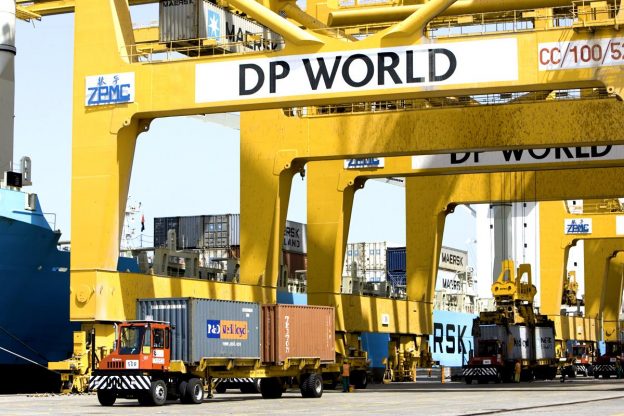The Dubai debacle has all the attractions of Brer Rabbit’s tar baby. Unfortunately, the political foxes of the deal that will transfer the operation of six or more U.S. terminals to Dubai Ports World have decided to ensnare the American people in their sticky mess.
For their objection to the transaction—only 17 percent of Americans approve—neoconservatives, joined by some libertarians, have been tarnishing security conscious Americans as anti-Arab racists, Islamophobes, and A-list ignoramuses.
Despite being pilloried, ordinary Americans have refused to do gut override when it comes to Dubya’s decree that the operation of port facilities in Philadelphia, Baltimore, Miami, New Orleans, Newark, N.J, Louisiana, Portland, and Texas be turned over to DPW, a company owned by one of seven emirates that form the federation known as the United Arab Emirates.
If nothing else, the deal provided a panorama of Bush’s off-putting character and barren brain. No sooner had he found out about the transaction than he assumed the eff-off position, daring Congress to stop or stall the transfer.
The authoritarian bully part of the president’s personality then reached for the ahistoric, ignorant, egalitarian element. He announced that there should be no difference between the levels of trust the United States bestows on the UAE and the United Kingdom.
Since the President doesn’t know that America is a rib from Britain’s ribcage, someone please assemble a slide show to instantiate in pictures what James P. Pinkerton expressed in the language we share with our mother country:
[E]ven during wartime, Americans have naturally looked to Britons for inspiration on law and culture; from William Shakespeare to the King James Bible to C.S. Lewis to J.K. Rowling, British letters have been America’s letters. In the past century the U.S. and U.K. were shoulder to shoulder in two hot wars and one cold war. Few Americans can forget the oratory of Winston Churchill, who rallied English speakers against Nazism. (And who were the Arabs rooting for in World War II? Just asking.)
The signature Bush non sequiturs followed in quick succession: “If there was any chance that this transaction would jeopardize the security of the United States, it would not go forward,” he barked.
Unscrambled, this would seem to imply that because the deal is going forward, it’s foolproof. Or, if B then A—a logical fallacy that evinces a short circuit in the man’s mind.
Bush isn’t the only one with frontal-lobe failure. The usual five loopy libertarians, who ordinarily oppose state ownership, changed their “minds,” and began chiming curiously for the deal. So long as Dubai did the honors, state-ownership was just droll.
The transaction embroils politicians—ours and theirs—in the usual tangled and tainted interests. But do these libertarians care that a state-owned company would likely subordinate profit (good) to politics (bad)? Nah. Suspending support for laissez faire capitalism in return for a temporary ideological advantage is all in a day’s work. In this case, the deal offers serious secondary gains to Arabists and anti-Israel jihadists.
Yes, yes, we know libertarians believe free trade promotes peace, even between enemies, by replacing animosity with self-interest. But stuff that. As if the prospect of an Arab company taking ownership of these already vulnerable ports was not appealing enough, DPW also boycotts Israeli goods. How sweet is that?
Ditched too for Dubai was the principle of States’ Rights. Not that the bigot brigade cares, but the ports and their protection fall to the states, not to the federal Frankenstein or its friends.
When in doubt, use the critical compass of private property: to understand the American people’s splenetic response to the transaction, pretend U.S. ports were private and not state run.
If the deal were devoid of the cupidity and corruption that comes with government “enterprise”—all those politicized paybacks—then it’s more than likely that the private property owners involved would react just as Americans have to the involvement of a Middle-Eastern, state-owned company in the management of their ports.
In all likelihood, if ports were privatized, we’d be witnessing similar pickiness as to who operates them. After all, the titleholders would have to underwrite the endeavor and would thus be extra cautious, for they’d be liable for the costs of an attack, not taxpayers. In a free market, even the perception of insecurity would cause insurance costs to soar. Fairness doesn’t factor into it.
There’s no doubt that port owners would have the same reservations voiced by 64 percent of Americans, the U.S. Coast Guard, before being reeled in by W. (the Guard worries about gaps in intelligence vis-à-vis the UAE company, and the possibility of its infiltration by radical Islamists), and a Miami-based port operator called Continental Stevedoring & Terminals Inc., which has, according to “Time,” “gone to court to challenge the measure on security grounds.” Most lawmakers concur, not least the especially incensed House Homeland Security Committee chairman, Peter King, R-N.Y.
To the extent popular response to the Dubai deal mirrors what would transpire under private property, it’s neither unethical nor unreasonable—it is what it is. Most American ports are owned by localities—states, cities, and local port authorities. This is the American people’s backyard. They feel they own the ports, which is why they responded as cautiously as any proprietor who prizes and protect what is his.
©2006 By Ilana Mercer
WorldNetDaily.com
March 3
CATEGORIES: Bush, Homeland Security, Middle East, Property Rights, States' Rights

 print
print